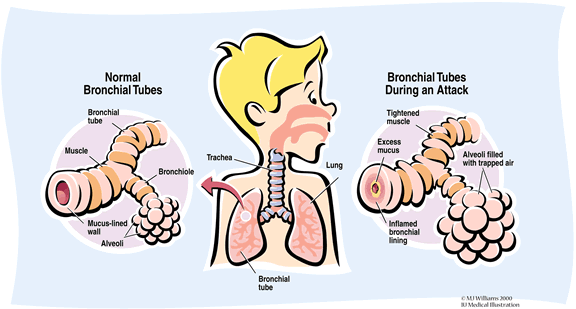Introduction
Asthma is the most common chronic disease in Ireland. Ireland has the fourth highest commonness of asthma in the world.
Asthma is a serious condition. One in five children in Ireland is having Asthma.
About 30 per cent of age under-fives has had at least one attack of wheezing. This means lots of parents have been told that their child has asthma.
Most often asthma is mild and easily controlled by medicines but sometimes children may have attacks that can be frightening and very worrying. Usually young children with wheezing episodes outgrow Asthma by school age. For parents it is always stressful to see their child suffers, no matter how mild the asthma may be.
Symptoms of Asthma
What is Asthma?
Asthma is a common chronic disease which inflames the airways. The airways are the small tubes that carry air in and out of the lungs. Asthma affects the airways to become over-sensitive and react to colds and flus or dust mites – even family animals, these are called triggers. The lining of the airways also swells and sticky mucus is produced and this bring breathe to be difficult.
Lots of children with asthma breathe naturally for weeks or months between asthma come back. When flares do appear, they usually look to take place without sign.
Asthma symptoms for babies can be different for every child. In baby’s asthma, babies may have all of asthma symptoms such as adults, or only one of those symptoms. As well, poor diet, sweating, or not showing comfortable can be symptoms of infant asthma.
Some of symptoms can be:
- Wheezing sounds from breathing
- Cough
- Changes in breath length
- Tension in the chest

Spotting asthma
Diagnose an asthma can be problematic and time- spending because every child with asthma can have very unique forms of symptoms.
General symptoms of asthma- chronic dry cough and during that child do not have a high temperature.
Second common symptom isasthma attacks when exposed to certain substances, for which the child is allergic or because of respiratory infections.
Depending on the frequency and severity of asthma attacks in children is mild, moderate and severe.
The attack begins with a cough, shortness of breath then develops (a feeling of lack of air).
Baby’s breath noisy and wheezing. Often before the attack runny nose, itchy rash on the skin. Older children at such times may complain of a feeling of pressure in your chest, and the lack of air.
Different types of asthma:
Doctors often use the words ‘mild’, ‘moderate’ and ‘severe’ to describe asthma.
Here is some explaining what they mean.
- Mild: Coughs and wheezes but plays happily and feeds well
- Moderate: Waking at night, can’t run around or play without cough or wheeze.
- Severe: Too restless to sleep, unwilling to play at all, too breathless to talk or feed, lips going blue.
Prevention of Asthma
For the treatment of asthma is often enough to remove the child from the allergen. If this does not help, the doctor prescribes anti-inflammatory treatment.
Asthma occasionally can grow out after colds.
Triggers of asthma
Knowing your child’s triggers and how to escape them is very important.
Here is a list of triggers and movements you can take to reduce their effect on your child’s asthma.
Avoid Colds and Viral Infections
Colds and viruses are a common trigger for children, especially during the winter months and when they return to school.
- Keep your child’s asthma under control by giving them their medication as prescribed.
- Keep a written asthma management plan to monitor their symptoms and to make sure, you know what to do when their asthma symptoms get worse.
- Stop the spread of colds and infections by is sure your child washes their hands.
House Dust
House dust is smallest organisms that survive in warm, dirty places such as rugs, soft toys and household chairs and coaches.
- Use anti-dust mite covers for children’s mattress, duvet and pillows.
- You wash these covers according to the manufacturer’s instructions;
- Wash all bedding at least once a week.
- Remove carpets where it can be possible.
- Vacuum rooms regularly.
- Clean all surfaces two to three times per week;
- Have soft toys to a smallest amount and hot wash them every two weeks.
Household Pets
A number of children’s asthma is triggered by an allergy to pets, frequently cats or dogs.
Cigarette Smoke
Cigarette smoke makes asthma more worse, can cause pneumonia, bronchitis
And infections of ears, and prevent asthma medication working effectively.
Keep your child away from cigarettes smoke.
Mould
Mould spores can increase chances for trigger asthma. Mould can be found anywhere, for example in bathroom, kitchen, even outside in the autumn leaves.
• Be sure that your home has good ventilation.
• Take away all indoor plants as they may be source of mould growth;
• Avoid drying clothes indoors or on radiators.
Changes in Weather
Some children’s asthma can be triggered by cold season or temperature changes,
• Bring your child for an asthma review with your doctor or nurse before the weather change
Chemicals
Use chemicals carefully, especially in household products such as cleaning products, cosmetics, paints etc.
• Do not using chemical products where it is possible.
• Do not allow your child be in areas where chemical products are used.
Asthma treatment
Treatment of this illness is divided into two groups:
One stop (cropped) attack, the other to prevent its development
.
In mild form of asthma are usually used drugs from the group of stabilizers of membranes of immune cells. This drug does not work at the time of attack. Under the power of drugs immune cells do not discharge stuffs that cause swelling and shrink the bronchi.
In severe forms to prevent attacks physician prescribes hormones, corticosteroids (eg budesonide, fluticasone). Do not be afraid of these drugs, because they act only on the bronchial mucosa. In severe asthma the risk of side effects is much lower than the risk of the sickness
Checklist for traveling to people with asthma and recommendations:
People who have asthma are needs to be prepared for a trip at least a few weeks before travel.
This includes:
- Asthma health check
- Asthma triggers
- Air travel
- Travel immunisation
- Travel insurance
Before you travel, review your personal asthma plan. Find how you can get help – medical help at those areas where are you planning to go.
Conclusion
It is important that the baby’s parents having asthma are not measured him seriously ill, possibly given a lot to move. When the child grows up, the attacks become rare, will follow more easily, and in many they stop altogether.
Do not refuse any treatment, including, if necessary hormones. Each attack – it is a huge stress for the child to be eliminated by all means.

Bibliography:
http://healthcaremall4you.com/asthma-at-children-causes-symptoms-treatment.html
view on 16th of November 2016
http://www.tipdisease.com/2013/10/asthma-in-children-babies-causes.html
view on 17th of November 2016
www.asthma.ie/sites/default/files/files/document_bank/2014/May/Asthma%20and%20Your%20Child_final.pdf
view on 16th of November 2016
www.asthma.ie/sites/default/files/files/document_bank/2013/Aug/asthma_in_babies_and_children_final.pdf
view on 17th of November 2016
http://www.irishhealth.com/clin/documents/Children%20and%20Asthma.PDF
view on 16th of November 2016
http://www.hse.ie/eng/health/az/A/Asthma-children/Treating-asthma-in-children.html
view on 16th of November 2016
www.irishindependent.ie
(issue on 31st of October 2016) view on 16th of November 2016
PLACE THIS ORDER OR A SIMILAR ORDER WITH NURSING TERM PAPERS TODAY AND GET AN AMAZING DISCOUNT

